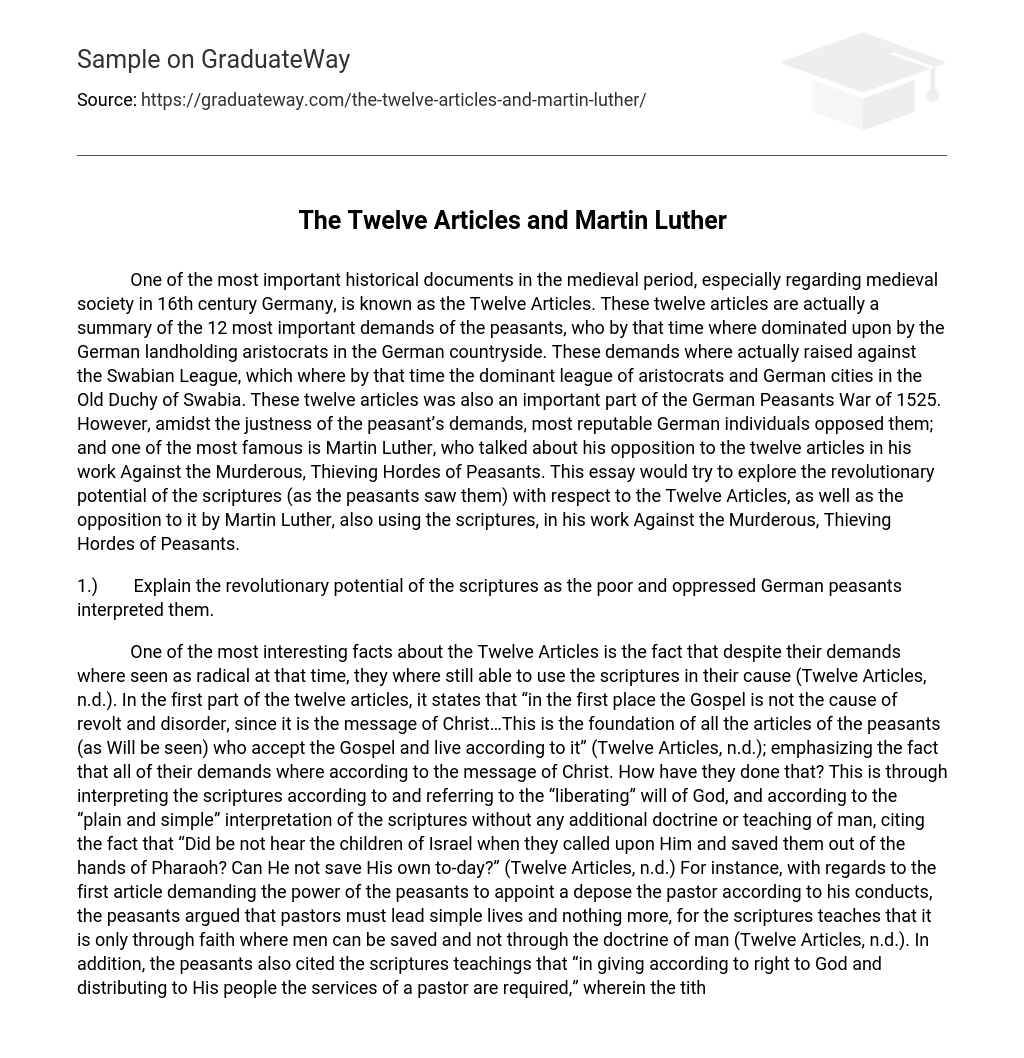One of the most important historical documents in the medieval period, especially regarding medieval society in 16th century Germany, is known as the Twelve Articles. These twelve articles are actually a summary of the 12 most important demands of the peasants, who by that time where dominated upon by the German landholding aristocrats in the German countryside. These demands where actually raised against the Swabian League, which where by that time the dominant league of aristocrats and German cities in the Old Duchy of Swabia. These twelve articles was also an important part of the German Peasants War of 1525. However, amidst the justness of the peasant’s demands, most reputable German individuals opposed them; and one of the most famous is Martin Luther, who talked about his opposition to the twelve articles in his work Against the Murderous, Thieving Hordes of Peasants. This essay would try to explore the revolutionary potential of the scriptures (as the peasants saw them) with respect to the Twelve Articles, as well as the opposition to it by Martin Luther, also using the scriptures, in his work Against the Murderous, Thieving Hordes of Peasants.
1.) Explain the revolutionary potential of the scriptures as the poor and oppressed German peasants interpreted them.
One of the most interesting facts about the Twelve Articles is the fact that despite their demands where seen as radical at that time, they where still able to use the scriptures in their cause (Twelve Articles, n.d.). In the first part of the twelve articles, it states that “in the first place the Gospel is not the cause of revolt and disorder, since it is the message of Christ…This is the foundation of all the articles of the peasants (as Will be seen) who accept the Gospel and live according to it” (Twelve Articles, n.d.); emphasizing the fact that all of their demands where according to the message of Christ. How have they done that? This is through interpreting the scriptures according to and referring to the “liberating” will of God, and according to the “plain and simple” interpretation of the scriptures without any additional doctrine or teaching of man, citing the fact that “Did be not hear the children of Israel when they called upon Him and saved them out of the hands of Pharaoh? Can He not save His own to-day?” (Twelve Articles, n.d.) For instance, with regards to the first article demanding the power of the peasants to appoint a depose the pastor according to his conducts, the peasants argued that pastors must lead simple lives and nothing more, for the scriptures teaches that it is only through faith where men can be saved and not through the doctrine of man (Twelve Articles, n.d.). In addition, the peasants also cited the scriptures teachings that “in giving according to right to God and distributing to His people the services of a pastor are required,” wherein the tithe of “man’s invention” must not be paid, especially in the form of excessive land rental rates and following due interests alone (Twelve Articles, n.d.). In this case, the peasants succeeded in arguing for a plain interpretation the scriptures, stating that abuses made in the name of the church are only an invention of man.
2.) How did Martin Luther use the scriptures to respond to the peasants’ claim?
The cornerstone of the argument made by Luther in his Against the Murderous, Thieving Hordes of Peasants is also a famous saying from the scriptures, which states that
“The peasants have taken on themselves the burden of three terrible sins against God and man…they have sworn to be true and faithful, submissive and obedient, to their rulers, as Christ commands, when he says, ‘Render unto Caesar the things that are Caesar’s,’ and in Romans XIII, ‘Let everyone be subject unto the higher powers.” (Luther 1525)
In this case, Luther referred to the appeal of the scriptures to submit to secular authority, to which the peasants have violated in making war against them. In addition, Luther also used the Christian values of faithfulness, obedience, and submissiveness to condemn their violence against the authorities, and even saying that the peasants committed blasphemy by citing the Holy Scriptures in their actions.
Reference List:
“Twelve Articles of the Peasants.” (n.d.). In The Peasant War in Germany by Frederick Engels. Retrieved from http://www.marxists.org/archive/marx/works/1850/peasant-war-germany/ch0e.htm.
Luther, M. (1525). Against the Robbing and Murdering Hordes of Peasants. Retrieved from http://www.cas.sc.edu/hist/faculty/edwardsk/hist310/reader/lutheragainst.pdf.





